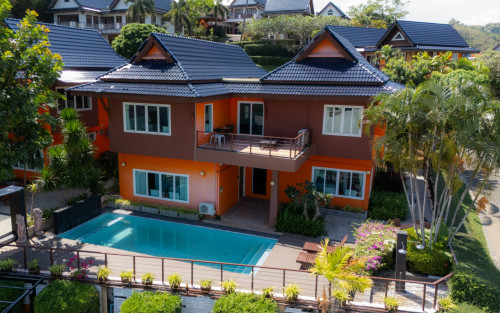
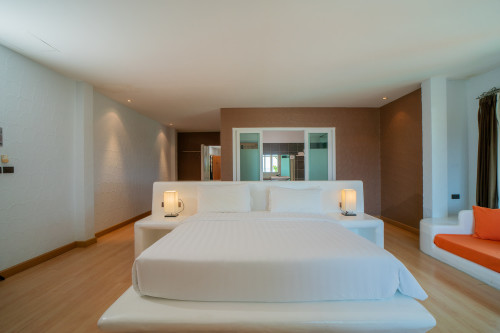
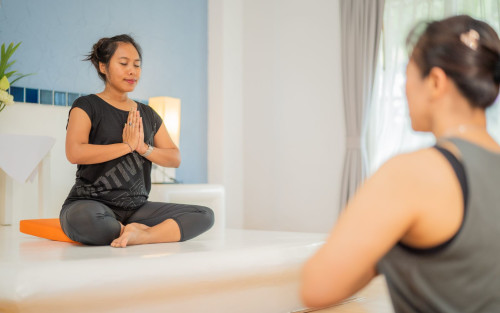
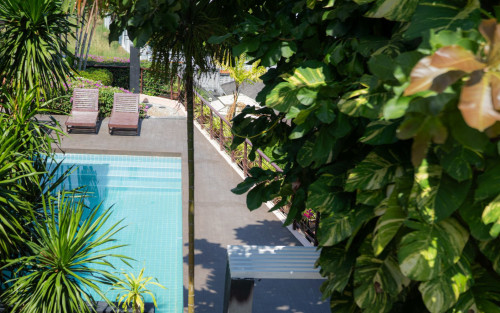
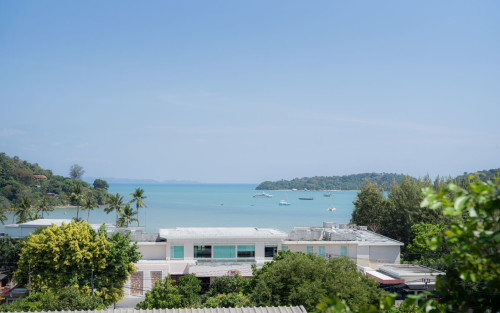




Phuket Island Rehab
Verified Center
This provider's information has been quality-checked by Recovery.com's Research Team for accuracy and completeness, including center verification through appropriate third-party organizations.
Treatment Focus
This center treats substance use disorders and co-occurring mental health conditions. Your treatment plan addresses each condition at once with personalized, compassionate care for comprehensive healing.
Primary Level of Care
Offering intensive care with 24/7 monitoring, residential treatment is typically 30 days and can cover multiple levels of care. Length can range from 14 to 90 days typically.
Treatment Focus
This center treats substance use disorders and co-occurring mental health conditions. Your treatment plan addresses each condition at once with personalized, compassionate care for comprehensive healing.
Primary Level of Care
Offering intensive care with 24/7 monitoring, residential treatment is typically 30 days and can cover multiple levels of care. Length can range from 14 to 90 days typically.
Private Pay
You pay directly for treatment out of pocket. This approach can offer enhanced privacy and flexibility, without involving insurance. Exact costs vary based on program and length of stay. Contact the center for specific details.
Phuket Island Rehab
Phuket Island Rehab
About Phuket Island Rehab
Phuket Island Rehab offers a tranquil sanctuary for addiction recovery, accepting only 12 clients at a time. Their treatment aims to address the body and soul, using a wide variety of evidence-based and holistic therapies for a comprehensive recovery experience. Led and founded by Dr. Pitsuwan, founder of a network of international medical clinics, Phuket Island Rehab centers their care around safe, expert-led clinical and therapeutic treatment. A thorough assessment and comprehensive health check-up set the foundations for tailored healing.
Personalized, Whole-Person Care
Phuket Island Rehab provides a thorough medical check-up and assessments for each client. This aspect of treatment allows staff to deeply understand each client’s unique medical and psychiatric needs, including detox needs. They provide medication-assisted treatment (MAT) as needed, with nursing staff available 24/7. An initial 1-hour consultation with their addiction psychiatrist informs additional treatment needs. Phuket Island Rehab also has a relapse prevention guarantee, welcoming clients back for a complimentary 30-day stay if they previously attended for 3 months and relapsed within 12 months post-treatment.
Clinically Informed Addiction Treatment
Clients at Phuket Island Rehab receive highly attuned, medically-based care for addiction and co-occurring conditions, including depression, insomnia, and trauma. They treat process addictions like internet addiction, gambling, and porn addiction. Clients attend group therapy, family therapy, and twice-weekly 1:1 sessions with their therapist. Therapists at Phuket Island Rehab use techniques like cognitive behavioral therapy (CBT) and eye movement desensitization and reprocessing (EMDR) to address underlying issues and instill coping skills.
An Island Recovery Destination
Phuket Island Rehab offers a unique judgment-free recovery experience, with private bedrooms, flexible technology, work access, and weekly excursions to local treasures. Each bedroom includes Wi-Fi, a desk, and a private bathroom. Weekends include trips to elephant sanctuaries, other nearby islands, Big Buddha, jungles, and Central Phuket. Phuket Island Rehab has an outdoor gym, nearby Muay Thai classes available, and an on-staff chef. A 24/7 team of security address any concerns. After treatment, clients receive 60 days of 1:1 support and can access online recovery meetings.
Highlights from the Center
Highlights
These highlights are provided by and paid for by the center.
Holistic Approach
Medically Assisted Detox
Budget Friendly
Addiction Recovery
Center Overview
Treatment Focus
This center treats substance use disorders and co-occurring mental health conditions. Your treatment plan addresses each condition at once with personalized, compassionate care for comprehensive healing.
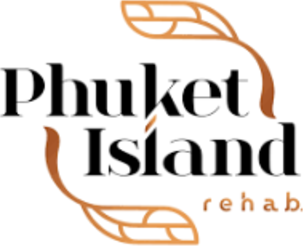
Phuket Island Rehab
Pricing and Program Length
Estimated Center Costs
The cost listed here ($5,000 - $8,900 USD /28 days), is an estimate of program cost. Center price can vary based on program and length of stay. Contact the center for more information. Recovery.com strives for price transparency so you can make an informed decision.




Recovery.com Verified Listing
Recovery.com verified that the name, location, contact information and license to operate for this treatment provider are valid and up-to-date.

Licensed by Thailand
Recovery.com is an independent, third-party mental health resource. Verification does not imply endorsement and does not guarantee the quality of treatment services.
Meet Your Care Team

Dr. Ponlawat Pitsuwan
Founder
M.D.

Parichat Senkum (Gift)
Psychologist
MSc Clinical Psychology

Nuttasit Arayawangso (Natee)
Head Nurse
Thai Nursing License

John A. Smith
Counselor
Certified Life Coach, SUD Treatment Professional (NAADAC/GCCC/ISSUP)

Lawan Thongpiw (Lek)
Support and Wellness Trainer

Arun Teeyakul (Jean)
Support Worker

Kevin Shupe
Support Worker

Pathu ¨Bonus¨ Sakultan
Human Resources

Arnon Fakkeaw (Ben)
Head Chef
Your Care Options
Specializations
Alcohol
Using alcohol as a coping mechanism, or drinking excessively throughout the week, signals an alcohol use disorder.
Anxiety
Anxiety is a common mental health condition that can include excessive worry, panic attacks, physical tension, and increased blood pressure.
Detox
Detox fully and safely removes toxic substances from the body, allowing the next steps in treatment to begin with a clean slate.
Benzodiazepines
Benzodiazepines are prescribed to treat anxiety and sleep issues. They are highly habit forming, and their abuse can cause mood changes and poor judgement.
Opioids
Opioids produce pain-relief and euphoria, which can lead to addiction. This class of drugs includes prescribed medication and the illegal drug heroin.
Smoking Cessation
Quitting smoking—i.e., ceasing to smoke—means giving up smoking nicotine and tobacco products. This process has very important health benefits.
Trauma
Some traumatic events are so disturbing that they cause long-term mental health problems. Those ongoing issues can also be referred to as "trauma."
Wellness
Wellness philosophies focus on the physical, mental, and spiritual wellness of each patient, helping them restore purpose with natural remedies.
Who We Treat
Adolescents
Teens receive the treatment they need for mental health disorders and addiction, with the added support of educational and vocational services.
Executives
Executive treatment programs typically directly support the needs of people who manage businesses and may provide flexible schedules and office space to allow work during treatment.
Young Adults
Emerging adults ages 18-25 receive treatment catered to the unique challenges of early adulthood, like college, risky behaviors, and vocational struggles.
LGBTQ+
Addiction and mental illnesses in the LGBTQ+ community must be treated with an affirming, safe, and relevant approach, which many centers provide.
Men and Women
Men and women attend treatment for addiction in a co-ed setting, going to therapy groups together to share experiences, struggles, and successes.
Midlife Adults
For adults ages 40+, treatment shifts to focus on the unique challenges, blocks, and risk factors of their age group, and unites peers in a similar community.
Mild Disabilities
Adults with mild physical or intellectual disabilities receive treatment catered to their specific needs in a safe and clinically supportive environment.
Treatment Services
Detox
Detox fully and safely removes toxic substances from the body, allowing the next steps in treatment to begin with a clean slate.
Residential
In a residential rehab program, patients live onsite, with access to daily treatment and 24-hour care. An average stay is 30-90 days.
Approaches
Evidence-Based
A combination of scientifically rooted therapies and treatments make up evidence-based care, defined by their measured and proven results.
Experiential
Expressive tools and therapies help patients process past situations, learn more about themselves, and find healing through action.
Holistic
A non-medicinal, wellness-focused approach that aims to align the mind, body, and spirit for deep and lasting healing.
Individual Treatment
Individual care meets the needs of each patient, using personalized treatment to provide them the most relevant care and greatest chance of success.
Therapies
1-on-1 Counseling
Patient and therapist meet 1-on-1 to work through difficult emotions and behavioral challenges in a personal, private setting.
Meditation & Mindfulness
A practiced state of mind that brings patients to the present. It allows them to become fully aware of themselves, their feelings, and the present moment.
Mindfulness Therapy
This ancient practice can be mental, emotional, and even spiritual. In meditation, you focus your attention on the present moment without judgement.
Adventure Therapy
This experiential approach uses the physical and emotional challenges of outdoor activities as tools for personal growth.
Art Therapy
Visual art invites patients to examine the emotions within their work, focusing on the process of creativity and its gentle therapeutic power.
Experiential Therapy
With this approach, patients heal by doing. Therapists help patients process difficult emotions to speak, using guided activities like art or dance.
Eye Movement Therapy (EMDR)
Lateral, guided eye movements help reduce the emotional reactions of retelling and reprocessing trauma, allowing intense feelings to dissipate.
Conditions We Treat
Pornography Addiction
A person with a porn addiction is emotionally dependent on pornography to the point that it interferes with their daily life and relationships.
Grief and Loss
Grief is a natural reaction to loss, but severe grief can interfere with your ability to function. You can get treatment for this condition.
ADHD, ADD
ADHD is a common mental health condition caused by dopamine imbalance. Common symptoms include inattention, hyperactivitiy, and impulsivity.
Anger
Although anger itself isn't a disorder, it can get out of hand. If this feeling interferes with your relationships and daily functioning, treatment can help.
Anxiety
Anxiety is a common mental health condition that can include excessive worry, panic attacks, physical tension, and increased blood pressure.
Burnout
Burnout entails mental and physical exhaustion, and leads to a severe lack of fulfillment. This condition is often caused by overwork.
Chronic Pain Management
Long-term physical pain can have an affect on mental health. Without support, it can also impact your daily life and even lead to addiction.
Codependency
Codependency is a pattern of emotional dependence and controlling behavior. It's most common among people with addicted loved ones.
Depression
Symptoms of depression may include fatigue, a sense of numbness, and loss of interest in activities. This condition can range from mild to severe.
Substances We Treat
Alcohol
Using alcohol as a coping mechanism, or drinking excessively throughout the week, signals an alcohol use disorder.
Benzodiazepines
Benzodiazepines are prescribed to treat anxiety and sleep issues. They are highly habit forming, and their abuse can cause mood changes and poor judgement.
Chronic Relapse
Consistent relapse occurs repeatedly, after partial recovery from addiction. This condition requires long-term treatment.
Co-Occurring Disorders
A person with multiple mental health diagnoses, such as addiction and depression, has co-occurring disorders also called dual diagnosis.
Cocaine
Cocaine is a stimulant with euphoric effects. Agitation, muscle ticks, psychosis, and heart issues are common symptoms of cocaine abuse.
Drug Addiction
Drug addiction is the excessive and repetitive use of substances, despite harmful consequences to a person's life, health, and relationships.
Ecstasy
Ecstasy is a stimulant that causes intense euphoria and heightened awareness. Abuse of this drug can trigger depression, insomnia, and memory problems.
Heroin
Heroin is a highly addictive and illegal opioid. It can cause insomnia, collapsed veins, heart issues, and additional mental health issues.
Psychedelics
Hallucinogenic drugs—like LSD—cause euphoria and increased sensory experiences. When abused, they can lead to depression and psychosis.
Languages
Aftercare
Care Designed for Your Needs
Personal Amenities
Amenities
Special Considerations
Family Member Stays
Treatment providers welcome family members to stay on-site to better the experience and success of patients and their families as a whole.
Flexible technology policies
Centers with flexible technology policies allow professionals to stay in touch with work and give patients a greater sense of connection and normalcy.
Activities
Yoga
Yoga is both a physical and spiritual practice. It includes a flow of movement, breathing techniques, and meditation.
Off-Site Activities
Off-Site Amenities
Learn More About the Center
General Facility Schedule
See what a typical week of treatment looks like at Phuket Island Rehab.
Answers to Common Questions
Phuket Island Rehab answers common questions about technology policies, traveling to Thailand, and more.
Facility and Amenities
Explore more of Phuket Island Rehab’s bespoke facility and the amenities it provides.
Health Check-Up Overview
Learn more about the intensive health check-up Phuket Island Rehab offers to each client.
What people are saying
Treatment
4.9
Accommodations
4.7
Food & Nutrition
4.6
Value
4.9
Pros
- Addressed Trauma (7)
- Treated With Respect (7)
- Beautiful Location (7)
- Personalized (7)
Tamer A
Treatment in 2024 • (60 days) • Reviewed 10/18/24
Former Client
•Medical field
•Middle East
John
Treatment in 2024 • (14 days) • Reviewed 05/15/24
Former Client
•Finance
Gabby B
Treatment in 2025 • (21 days) • Reviewed 03/06/25
Former Client
•USA
Michael H
Treatment in 2024 • (30 days) • Reviewed 07/10/24
Former Client
•Retired Electrician
•Australia Cairns
Nick Jamison
Treatment in 2024 • (30 days) • Reviewed 06/05/24
Former Client
•Carbon Consultant
•Hong Kong





